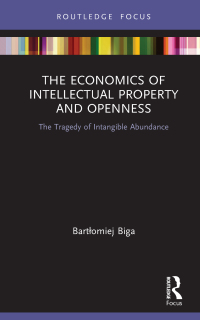Buy The Economics of Intellectual Property and Openness: The Tragedy of Intangible Abundance 1st Edition PDF ebook by author Bart?omiej Biga – published by Routledge in 2021 and save up to 80% compared to the print version of this textbook. With PDF version of this textbook, not only save you money, you can also highlight, add text, underline add post-it notes, bookmarks to pages, instantly search for the major terms or chapter titles, etc.
You can search our site for other versions of the The Economics of Intellectual Property and Openness: The Tragedy of Intangible Abundance 1st Edition PDF ebook. You can also search for others PDF ebooks from publisher Routledge, as well as from your favorite authors. We have thousands of online textbooks and course materials (mostly in PDF) that you can download immediately after purchase.
Note: e-textBooks do not come with access codes, CDs/DVDs, workbooks, and other supplemental items.
eBook Details:
Full title: The Economics of Intellectual Property and Openness: The Tragedy of Intangible Abundance 1st Edition
Edition: 1st
Copyright year: 2021
Publisher: Routledge
Author: Bart?omiej Biga
ISBN: 9781003098386
Format: PDF
Description of The Economics of Intellectual Property and Openness: The Tragedy of Intangible Abundance 1st Edition:
“This book focuses on the economic aspects of intellectual property (IP). It includes considerations of the wider category of intangible assets, however, the primary focus is devoted to patents which the author argues are the most vivid example of the Tragedy of Intangible Abundance (TIA). TIA touches upon a key issue in the contemporary economy. On the one hand, there is an enormous supply of intellectual property, yet, on the other, such an abundance does not necessary solve existing issues but rather creates new ones as well. This book elaborates on the reasons for the emergence of TIA and its consequences. The author uses clear metaphors to explain very complex issues. The book provides a valuable and interdisciplinary analysis of the field and offers practical solutions. It is based on the data collected by the author during the qualitative research he conducted among a group of start-ups. It presents guidance on determining which instrument is the most efficient for a particular situation. It also provides arguments for decision-makers and their advisors as to why a more open approach towards intellectual property would be more beneficial under many circumstances in the contemporary economy. While universal issues are addressed, the author distinguishes the European perspective, too. The book is written in a clear and concise style and covers all of the crucial aspects of IP management. It will find an audience among scholars of economics and business”–





